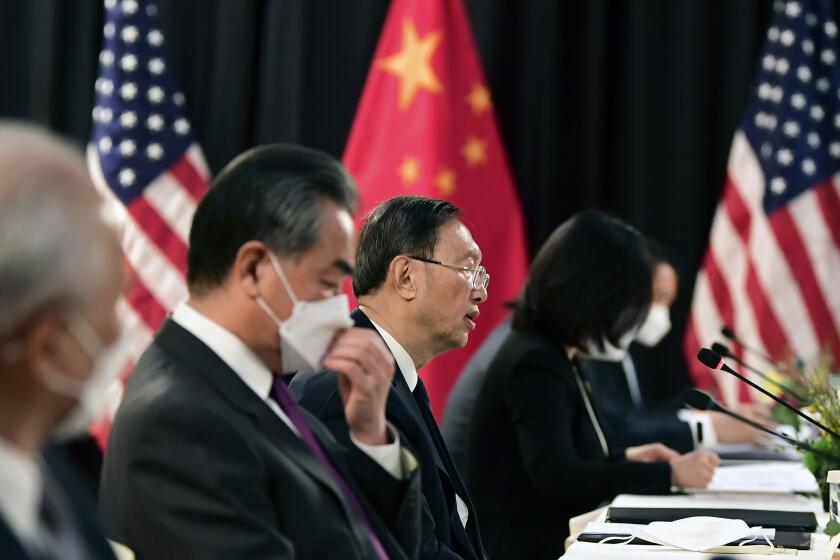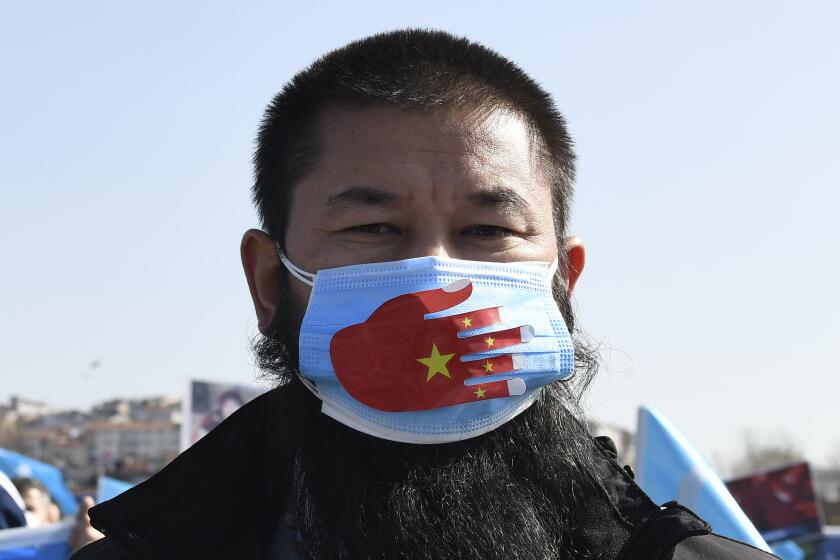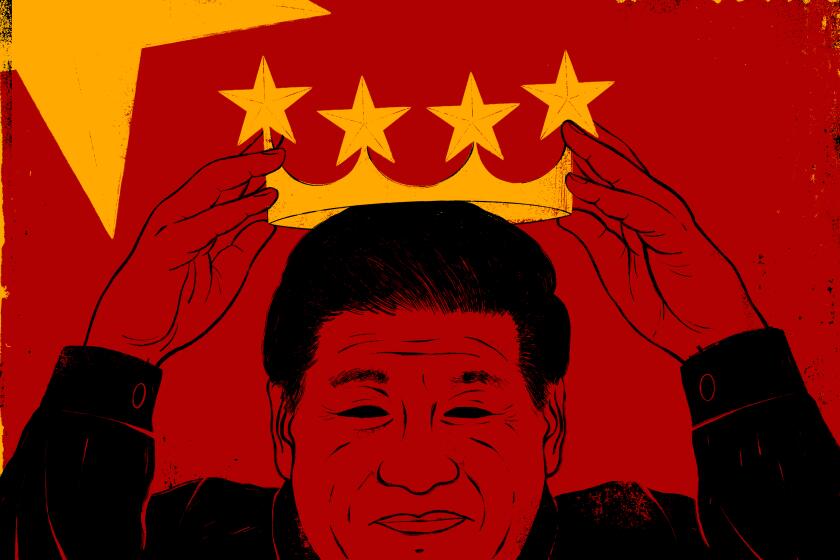As Communist Party turns 100, China’s Xi rallies his compatriots and warns his critics

- Share via
BEIJING — He pumped a fist into the air, standing in a Mao suit at a lectern stamped with a hammer and sickle, as 70,000 spectators in Tiananmen Square clapped and cheered.
“Long live the great, glorious, correct Chinese Communist Party!” cried Xi Jinping, China’s president and general secretary of the party, as he closed an hourlong speech Thursday marking the party’s 100th anniversary.
“Long live the great, glorious, heroic Chinese people!” Xi said, pumping a fist again. The crowds rose to their feet, waving bright red party flags. Ten thousand doves burst into the air, soaring over the square as a military band began to play.
It was a gray, drizzly morning of choreographed joy, preceded by a months-long nationwide campaign to propagate an official history that had been airbrushed to erase the tens of millions of deaths caused by Communist Party rule.
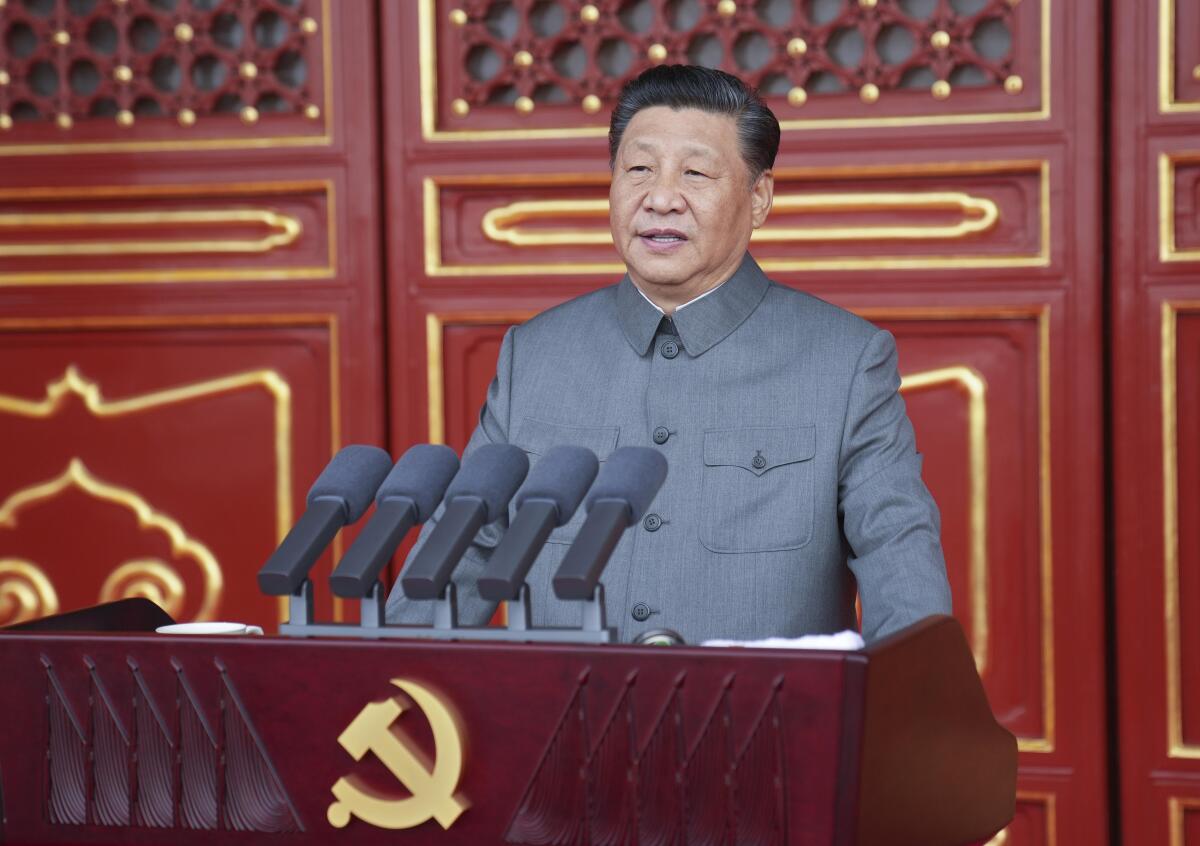
The mass display of triumphant nationalism was meant to bolster public faith in the party while underscoring the path that Xi has laid out for the nation’s future: greater party control over every aspect of life, resistance to “foreign oppression and bullying,” denial of China’s own bullying behavior and total erasure of the party’s past and present mistakes.
As the sun rose in a humid sky, 70,000 attendees, including delegates in ethnic minority costumes, vaccinated journalists and children’s choirs in red scarves, filed into Tiananmen Square, the symbolic heart of power in China. They serenaded the party with songs such as “Without the Communist Party, There Is No New China” — a tune that detainees in jails and reeducation camps have said they are forced to sing.
Military jets flew overhead, some dangling party flags and banners with party slogans, others forming the shape of “100.” Soldiers marched in goose step under a red arch emblazoned with the hammer and sickle as cannons fired 100 rounds.
As the Communist Party’s centennial nears, China is erasing official wrongs and party history to create a triumphalist story for a young generation.
Communist Youth League representatives delivered a spoken-word presentation, chanting slogans coined by Xi and shouting: “I offer my youth to the party. Please, party, don’t worry, the strong nation has me!”
Authorities had tightened security measures leading up to Thursday’s celebration, whisking many dissidents and activists away into detention or forced “travel” as they often do around politically sensitive dates, closing central streets and subway lines in Beijing, and threatening punishment for any local officials who allowed “accidents” to mar the celebrations.
In a defiant address, Xi warned outside forces against trying to hinder his country’s unstoppable rise.
“The Chinese people have never bullied, oppressed or subjugated other countries’ people, not in the past, present or in the future,” Xi said. “The Chinese people also will not allow any foreign power to bully, suppress or subjugate us. Anyone who has delusional thoughts of doing so will have their heads smashed and blood flowing against a steel Great Wall constructed by 1.4 billion Chinese people’s flesh and blood!”
The crowds roared.
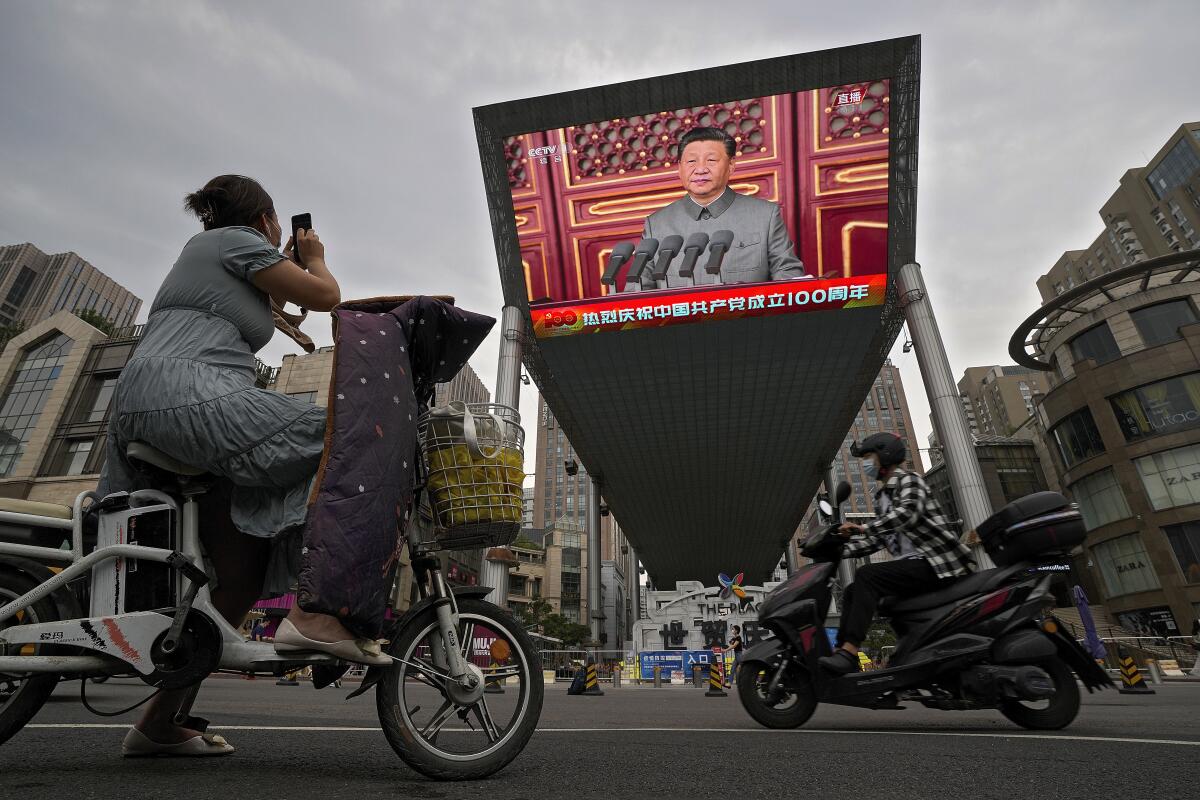
The statements come at a time when Beijing’s global image is at a low. Animosity toward China has risen among many countries because of its dismantling of freedoms in Hong Kong, mass internment of minorities in Xinjiang, lack of transparency surrounding the COVID-19 pandemic, military aggression toward Taiwan and in the South China Sea, border tensions with India, and economic coercion and hostage-diplomacy tactics against Australia, Canada and other nations.
A recent Pew Research Center poll conducted in 17 advanced economies found that large majorities in most of the countries had broadly negative views of China, including more than 75% of respondents in Japan, Sweden, Australia, South Korea and the U.S. Majorities in every country except Singapore, which also has an authoritarian system, said they had little or no confidence in Xi to do the right thing regarding world affairs.
Such opinions seem to matter little to Xi and the party — they have bolstered China’s influence among developing nations by investing in infrastructure and providing vaccines and are more concerned about stoking nationalistic pride at home than appeasing foreign critics.
Xi said the party welcomed “helpful suggestions and constructive criticism” from foreign interlocutors. “We will not, however, accept sanctimonious preaching from those who feel they have the right to lecture us,” he said, adding that the party should solidify its command over the military and build it up to “world-class standards.”
Beijing’s rejection of criticism from America and its friends has grown shriller as the Biden administration demonstrates its ability to pull allies together.
The president reasserted his “Chinese dream” of a rejuvenated nation, defined by two centenary goals: becoming a “moderately well-off” society by 2021 (achieved, according to Beijing), a century after the Communist Party’s founding, and becoming a “modern socialist country that is prosperous, strong, democratic, culturally advanced and harmonious” by 2049, when the People’s Republic of China turns 100.
He also sought to enlist the Chinese diaspora in that effort, calling a “patriotic united front” between Chinese people at home and abroad the party’s “magical weapon” for national rejuvenation.
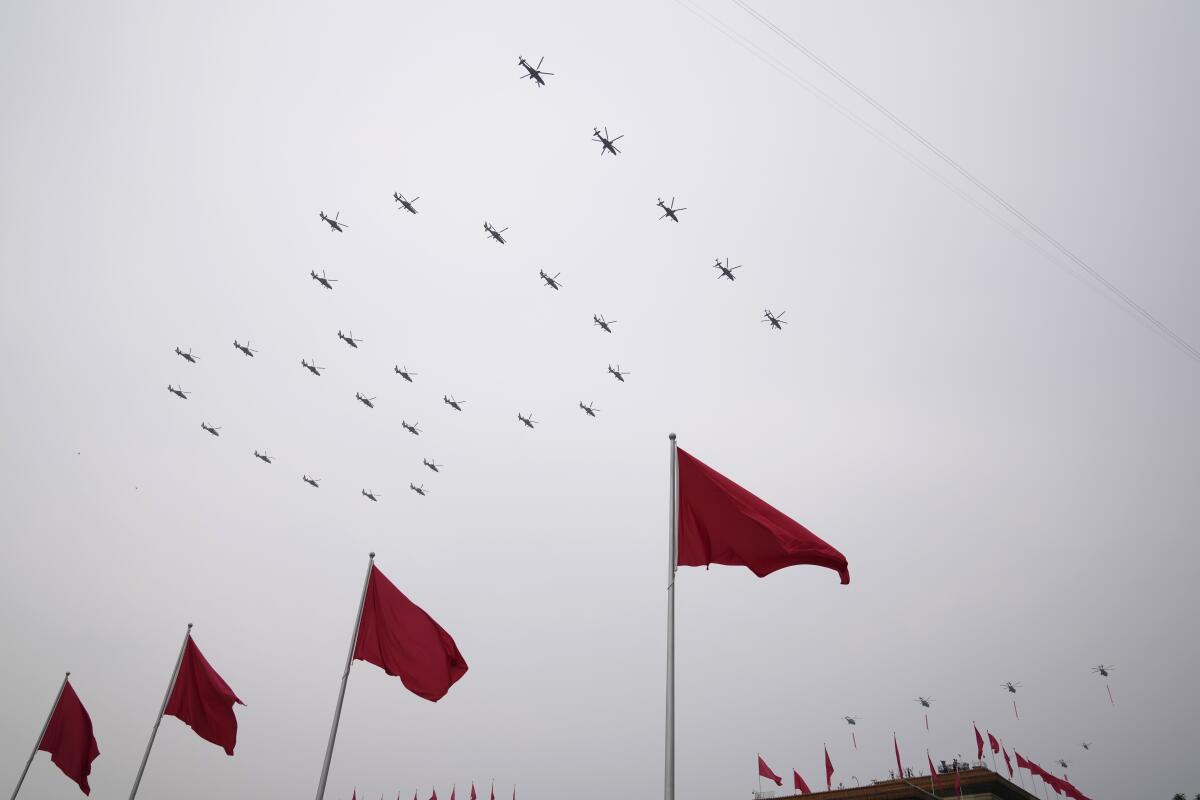
Such ethnic nationalist language has fueled both assimilation campaigns directed at ethnic minorities within China — including the mass incarceration and indoctrination of Uyghurs and others in Xinjiang — and pressure on Chinese nationals abroad to stick to the party’s political line.
Xi’s vision of unity and control have also driven Beijing’s crackdown on Hong Kong. A national security law imposed on the territory a year ago has resulted in the imprisonment of legislators, activists, journalists and protesters; the shutdown of media programs and outlets critical of the government; censorship of books and movies; an overhaul of the education system; and the exodus of many Hong Kongers.
The president also drew applause when he spoke of taking over Taiwan, the democratically ruled island next to China that is independent in all but name. He called it the party’s “unswerving historical mission” and the “common wish of all China’s sons and daughters” — ignoring the majority consensus in Taiwan against a takeover by the Communist Party, which has never ruled the territory.
“No one should underestimate the Chinese people’s strong determination, will and great power to defend national sovereignty and territorial integrity,” Xi said.
The Chinese government uses fear, division and propaganda to suppress discussion on Xinjiang, as it claims that all citizens support its policies.
Aside from warning against external interference, Xi signaled that he would continue to tighten internal party discipline and control. The party must “resolutely wipe out every factor that damages party purity or advancement, wipe out all viruses that gnaw at the party’s healthy body and ensure that the party does not change its quality, color or taste,” he said.
In Xi’s view, one of the biggest threats to party security lies at the core of Thursday’s celebration: history. Shortly after coming to power in 2012, he warned that “historical nihilism” — the questioning of past leaders and mistakes — played a role in the Soviet Union’s downfall.
He is determined to prevent that from happening in China, especially as many survivors of the Mao Zedong era, when tens of millions died of starvation and in political purges, have called for reflection on the systemic and political mistakes of that time. The Deng Xiaoping era, when market reforms brought rapid economic growth to China, was a much better time for most Chinese people, although rapid growth also brought inequality, corruption and other social problems.
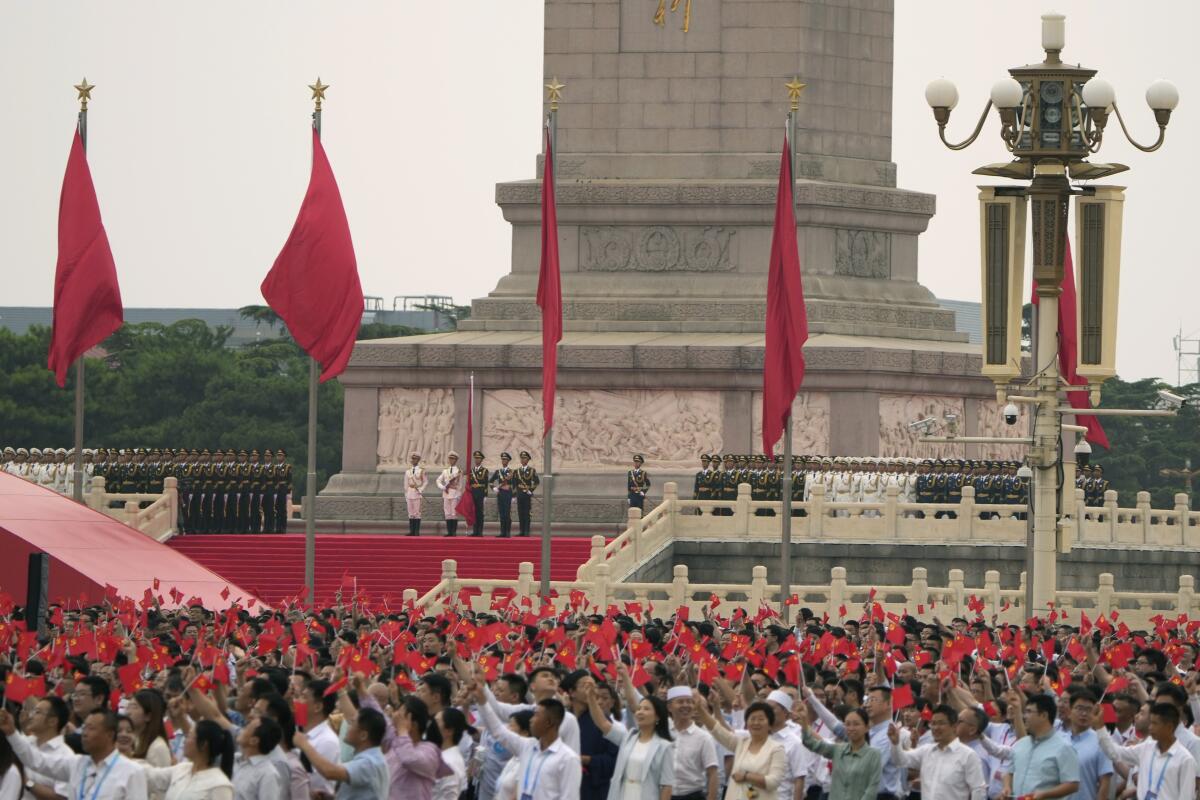
In a 2013 speech, Xi said that neither era should be used to deny the other, lest “hostile forces” use the questioning of history to drive a wedge between the party and the people.
Accordingly, on Thursday he acknowledged no mistakes made by the party, instead listing previous leaders by name and calling for their contributions to be forever remembered.
He stood directly above Mao‘s portrait atop the Gate of Heavenly Peace, looking out over Tiananmen Square and reprising a legendary scene from nearly 72 years ago when Mao reputedly watched the flag of the People’s Republic being raised for the first time and declared: “The Chinese people have stood up.”
Xi drew a straight line from that era to his. The party and Chinese people had a message for the world, he said: “The Chinese nation has ushered in great leaps from standing up to getting rich to getting strong.”
National rejuvenation had entered an “irreversible historical process,” he said. “History and the people have chosen the Chinese Communist Party.”
China’s paramount leader, Xi Jinping, sees himself as a savior, anointed to steer the Communist Party and China away from corruption and foreign influence, into a ‘new era’ of prosperity, power and political devotion. Whether his vision matches reality is another question.
More to Read
Sign up for Essential California
The most important California stories and recommendations in your inbox every morning.
You may occasionally receive promotional content from the Los Angeles Times.
